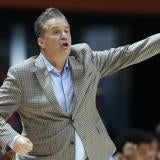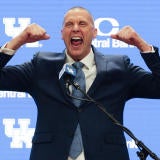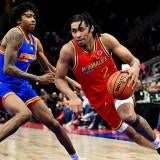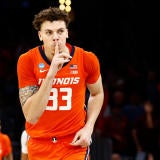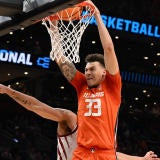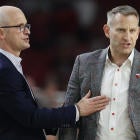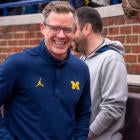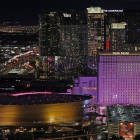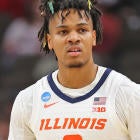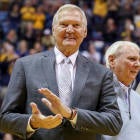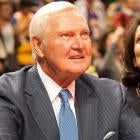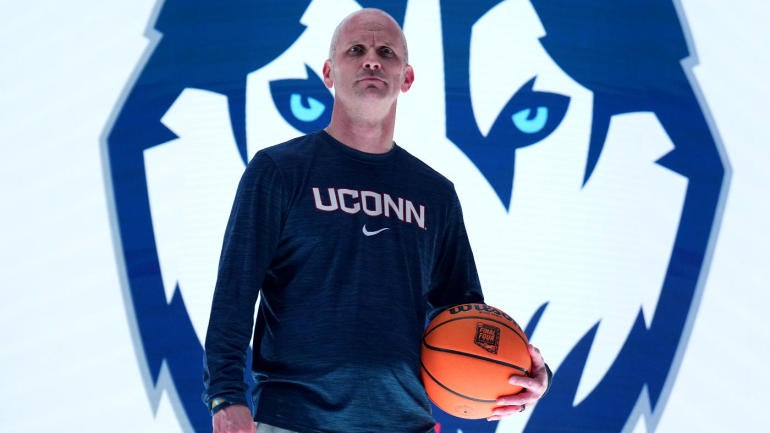
On Monday, UConn coach Dan Hurley turned down a six-year, $70 million offer to coach the Los Angeles Lakers. It was a decision of significant consequence for the NBA and college basketball. Hurley, instead, will remain in college and has his sights set on trying to win a third straight national championship. CBS Sports spoke with the reigning national coach of the year on Thursday morning. Over the course of a 45-minute conversation, Hurley explained how the Lakers' offer surfaced, his trip to Los Angeles, why he was never missing that Billy Joel concert at Madison Square Garden and, ultimately, the factors that led to him staying put in Storrs, Connecticut. This interview has been edited for clarity.
CBS Sports: What was your reaction when your agent called you last Monday and says this Lakers thing is really real? It's a different deal than Kentucky. Were you anticipating this? How did it land with you initially?
Dan Hurley: Because it's the Lakers it lands differently. If your whole life has been basketball and the LA Lakers call, it's an exciting moment. Your imagination goes wild because, if you're a historian and you love the game, all your memories as a child of watching it, thinking about it, it's like a really exciting moment.
CBS: What emotions did you have walking into the Lakers' facility?
DH: It was exciting. There was some nervous energy in that way too, obviously. I had developed a rapport with Rob Pelinka over the course of a couple days that week. There had been pre-draft conversations with Rob about our players. I've had good conversations with Rob. Remember, Jordan Hawkins was a target of theirs in the last draft. So, I wasn't going in totally blind, relative to Rob, there was a comfort level with Rob. But meeting Jeannie Buss and the Buss family of the Lakers, was like, I think when she kind of walked in and (I) said, 'Oh, shit.'
CBS: What was the tenor of the meeting? Were they hard-selling you?
DH: I think it was, for us, it was basically adapting the things that we do at UConn — from an offensive standpoint, from a defensive standpoint, from a culture, a player development standpoint — and adapting that to one of the greatest franchises in all of sports. Combining what we built here in terms of our basketball identity and combining that with one of the greatest brands in all the sports in the world.
CBS: What were you thinking when you walked out of the building, got on the plane and flew back home?
DH: This is going to be brutal. This is going to be a hard choice. And I think, in general — and it's weird, because some of the advice, and there's just all these different things too, because you've got a lot of things going on in your mind — but it's funny, in the end, I just had this conversation with Alex Karaban. If a decision is really hard whether you should stay in a place or leave a place, and you're torn, you probably should never go. You should only probably leave a place if it's a clear thing to do. And so really, I just backtracked and just did what I told Alex.
CBS: I know he's only one player on the roster, but Alex did have a 50/50 draft decision. He decided to come back and play for you, and then the entire situation flipped on its head in short order. Did you have some looming potential guilt over leaving the roster behind, leaving him behind after he had committed and wouldn't have been able to go back in the draft? I'm wondering if that might have played a bigger role than some people might have suspected.
DH: Big. Yeah, that that was big, that was big, that was important. And again, I don't know, like, if he stays in the draft … I'm not sure what that does, because some players, the other returners, and then the transfers and the high school guys — the window would open up for them. But their options would be very limited at this point in the summer. There would have been an opportunity, just not knowing for the entirety of the group, but Alex in particular. Yeah, that was real. That came up a bunch of times, and I actually talked to him on Sunday. And I didn't talk to many people. I put the phone away at that point, but he was one of the few people I called and spoke to.
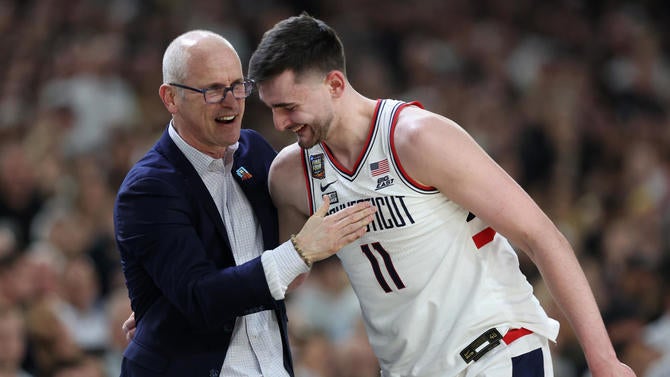
CBS: What did he tell you when you talked to him?
DH: He was good, but I want to keep a lot of that between us. He told me he'd be disappointed, but basically, he understood. Because this was like the equivalent, for these guys, of being a lottery pick, being a top-five pick, to coach the Lakers was the equivalent for me of being the top pick in the draft of coaching.
CBS: What about the program and what you would have left behind, and from a coaching perspective? Kimani (Young) would've been the guy that you would've wanted to run the program, but the uncertainty of whether or not he would get that chance, did that have any impact on your decision?
DH: It was on my mind, but I wasn't really at that point of necessarily leaving so it didn't really factor in. But it was something that was on my brain.
CBS: Outside of your family, who else did you lean on most heavily for either seeking counsel or advice as you went through this process?
DH: Seth Greenberg. He's always been a great, great advisor and counsel for me. People that I have really have a lot of respect for. Tom Izzo. I talked to him. He was very helpful. Billy Donovan has always been somebody I talked to a lot. Brad Stevens, Quin Snyder. Quin Snyder is a really smart guy who, I know that they (the Atlanta Hawks) really like Donovan (Clingan), so I was able to kind of talk to them about Donovan, but then also to pick his brain in large part.
CBS: Did you seek out or try and seek out Mike Krzyzewski at all? Because he turned down the Lakers 20 years ago under different circumstances.
DH: No. I mean, I was so overwhelmed at a point that, you know, I was a little paralyzed.
CBS: How did it feel to go through this process being so public? You obviously have a long standing relationship with Woj, who put it out there. You going through this was a different deal in that everyone kind of knew the cadence of your decision publicly.
DH: It was "The Truman Show," or whatever. Being in the last couple Final Fours and winning it and the place that we've taken the program in college maybe prepared me to a degree for it, but nothing like this. Being out there and having breakfast and people taking your picture …
CBS: Wait, you were eating breakfast out in L.A. and people were coming up to you?
DH: Yeah, driving by on bikes and double-taking you, yelling something about the Lakers. Like, walking out of the workout room at the hotel the day I was meeting with them, after getting my cardio in, and I'm literally rounding the corner and there's a med student, a UConn student who's there as part of a bridal party, who's bending the corner and I almost knock into her. And we kind of make eye contact and we both keep walking. And then she recognizes me and comes back, 'Hey, Coach, I go to UConn. Don't go. I'm here for a wedding. You're not going, are you? I know why you're here.' It was weird, just weird, weird stuff.
CBS: Wow, that is incredible.
DH: [In New York] I saw a friend of our family, the Lynch family from Jersey City. I grew up with this woman's brother, and he passed away, and he was one of my brother's best friends and was a really good friend of mine as well. And he died maybe 15 years ago. And I bumped into his sister at the Billy Joel concert as I'm walking out to the street to get into Uber. And she comes up to me and says, "You're not Hollywood. Like, you're not really going out there, are you? You're not Hollywood, right? You know that, right? [Hurley laughing as he recalls the interaction.] You're from New Jersey. You're not going, you're not Hollywood."
CBS: Did these moments impact your decision?
DH: Ultimately, everything does. Because you're wavering. Most of the time your feet are here. But when it starts, you're considering it. There were times where I'm imagining, so strongly, coaching LeBron and your first team meeting, and what guys would you like with the 17th pick that you could collaborate with Rob on. Just thinking about these kinds of things.
CBS: With your coaching ability, but also your ego, did the prospect of potentially coaching Lebron James heavily tempt you? Did you talk to LeBron at any point in this process?
DH: That was one of the pluses. It was one of the draws, was the chance, in your lifetime, to have coached one of the greatest players of all time. I have a lot of confidence that my work ethic and my expertise and my ability to connect with him would have made for a great partnership there. That was a huge draw for me. We texted some and I'm smart enough to have had some communication there, because you would want to, obviously, begin that relationship. Or, you know, that he's got sons that are really good at basketball, if I was going to stay in college.
CBS: I have to ask about the Billy Joel concert the day after the Lakers interview. Who bought the tickets? How long did you know you were going and how did you work your life around making sure you attended that concert?
DH: I mean, we've had to cancel that in the past. Me and my wife were going to go in September to see him at Fenway, I believe, or I don't know if it was MSG or Fenway, and we had to cancel it because of a recruiting visit, and it was Luke Murray's doing. So the onus was on Luke to make amends for that. And it just so happened that that's when it fell and I was not canceling it twice, no matter what. Billy is older, and you just don't know how many more times you'll be able to see him. You think I was going to miss that?
CBS: What if the Lakers interview wound up on that Saturday? Would you have missed it then? What if it actually interfered?
DH: Ahmad Nowell had graduation on Friday. It's weird how the whole thing worked out, because there might not have been a window for me to get there. I guess I would have maybe gone (to LA) on Sunday, but I just don't know where the window would have been for me, because I would have kept practice at Friday if Ahmad didn't have graduation. Because he had graduation on Friday, we had to move the practice. … How it all worked out was with his graduation gave us the window to fly out late Thursday night, and then just spend the whole day there with everybody on Friday and then get the flight back Saturday morning.
CBS: I want to stick on two more questions with the Billy Joel concert. One, did you know who Trey Anastasio was when he came on? Were you remotely aware of the rarity of what was happening there? Any thoughts on Trey's guest spots with Billy?
DH: I was not. I had no idea who that was. So, Phish? He's the guitarist for Phish? Yeah, I did not know who that was and it did not dawn upon me until the folks around me were buzzing.
CBS: Incredible. OK, also, Luke (Murray) posts a nine-second Instagram story that night. From the outside looking in, like it's like, Well, he's back in New York. He's at the Garden. He's seeing Billy Joel in Storrs South after he just got back from the Lakers. No one knew where you were, and Luke's a smart guy. So I'm wondering if he asked you if he could post it, and if you had decided in that moment what you were doing or not?
DH: No, I was completely undecided. We were just taking a mental break. We didn't even talk about it in the Uber over to the Garden. I think we were so stressed. I'm not complaining, because I love every second of it, but you go until the season ends, it rolls into the portal, and it runs into NIL fundraising, it rolls into being back at practice. Your season's longer than everybody else's, except for Matt Painter. And you get this night where you've had a couple beers and you're at the concert, you've got great seats, and you're just having fun, and you're probably not thinking about the ramifications. I think my wife posted something. Another guy we went with, a friend of theirs that was there with us, they were posting it. I don't do a lot of that, so we didn't think much of it. And then we saw [the reaction], and it's like, "Oh, shit."
Dan Hurley and his wife Andrea looks super happy at the Billy Joel concert tonight at MSG with Coach Luke Murray 👀 (via coachlukemurray/IG) pic.twitter.com/8TY4cpEjsb
— Evan Rodriguez (@EvanRodriguezCT) June 9, 2024
CBS: I said this on the podcast, but if you had gone to the Lakers, it would have been a tough look after the fact. I think it gave UConn fans even more hope than they had before that.
DH: [Laughing] What were we supposed to do, just go to the concert and put a bag over our heads?
CBS: I'm not saying you had to do anything. I'm just saying by posting it, some people were reading into it like he's back on his home turf, he's at Storrs South, he's posting about being at Billy Joel with a New York, New York shirt on.
DH: I just don't have a lot of clothes. I spent like $70 on that T-shirt, so I wanted to — it's like, my best T-shirt now. But I didn't know what I was doing at that time. Really, until we went to bed Sunday night — we had an idea — and then me and my wife Sunday morning, we were on the same page with my sons and everybody. I felt like I had all the information. The last piece was getting in front of the team and with the staff.
CBS: What did your brother Bobby say? Did he want you to go? Did he want you to stay in college?
DH: It would've been nice because I would have been close to him. Bob just gave me the pros and cons and the unemotional reality, which was great. There was no bias. And that's what you realize when everyone that you're talking to has some bias. There's the advice they're giving you, their perspective is a bias. And Bob had none. He just stayed in the middle and was able just to talk it through with him and do the pros and cons in an intelligent way.
CBS: How did you come to this decision, and how much did Andrea also have a say in what was your choice on Sunday night to stay at UConn?
DH: The whole team's a great team, and she's the coach of that team, I'm her associate coach, and we did it together. We just talked it through. We've made great moves throughout. Great moves, smart moves. We went through the same looking at it from every angle, the process that we've been talking through every aspect of it, which makes it tough, because you're talking about a lot of stuff, and it's very intense, but we talked about it from every angle. Career, family, personal goals. Happiness. Fulfillment.
CBS: Did you say "no" to the Lakers or "yes" to UConn?
DH: Oh, yeah. "Yes" to UConn. "Yes" to UConn.
CBS: There has been loose speculation and broad assumption that this saga doubled as a leverage play with your contract. You say that's not the case.
DH: One of the biggest misnomers that I've seen, and I've had a chance to see some things [in the media], is this was a leverage play. It was a zero leverage play. Zero. I mean, zero. How much more leverage do I need? We just won back-to-back championships. I didn't need leverage and I wouldn't have tortured myself if there wasn't some strong, like, should I do this? I thought it through. I wanted to give it great consideration. It has nothing to do with improving my position here.
CBS: I don't know how well it would have sat with you if you had done it and not done great there. I'm not saying you would have failed …
DH: Because I wouldn't have failed. I would have done a great job. I would have won NBA championships and I would have been one of the few coaches ever (to win an NCAA and NBA title). I would have joined Larry Brown.
CBS: That's what I'm getting at. Maybe that's something that's in the future, at a spot maybe that's better suited to you?
DH: Yeah, maybe. Or maybe not. Maybe I don't ever do it. I don't HAVE to do that to fulfill myself. In the end, I love coaching and I also love control. And as whiny as everybody is about the state of college basketball, like, it's not THAT bad. I mean, it's not great, but it's not like it once was. But hopefully you get a little better leadership and a little more structure and things can settle down a little bit. But at the end of the day, I get to coach 18- and 19-year-old kids. And you can make an impact. I'll go sit at the draft in 10 days with people whose lives you helped change. That, to me, matters a lot. Once the money and the ego and all that stuff is out, I love coaching. I love to run a program. That's what's important to me.







